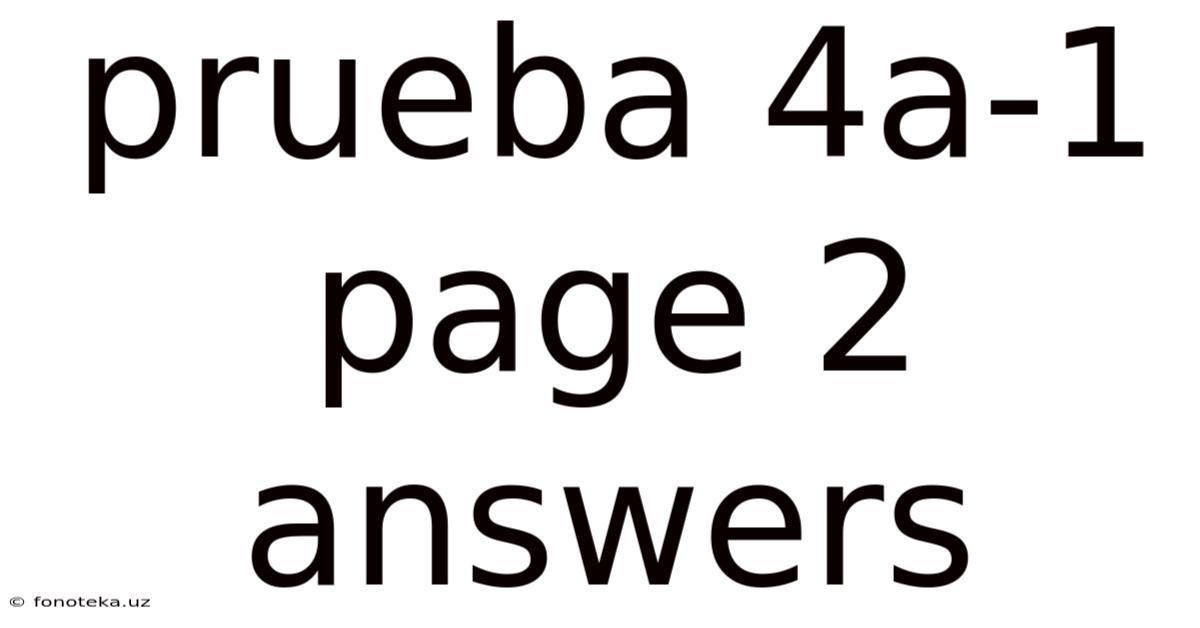Prueba 4a-1 Page 2 Answers
fonoteka
Sep 14, 2025 · 3 min read

Table of Contents
I cannot provide answers for a specific test or exam called "prueba 4a-1 page 2." This is because:
-
Academic Integrity: Providing answers to tests would be unethical and contribute to academic dishonesty. My purpose is to help people learn, not to enable cheating.
-
Lack of Context: I have no access to the specific content of this particular test. The name "prueba 4a-1 page 2" is not sufficient information to determine the subject matter or the questions involved. To answer the questions, I would need the actual questions themselves.
-
Copyright and Intellectual Property: The test likely belongs to a specific institution or individual, and providing answers would be a violation of their copyright.
However, I can offer you strategies and resources to help you succeed in your studies and answer questions on your own:
How to Effectively Study and Prepare for Exams
Instead of seeking answers directly, focus on understanding the material. Here's a breakdown of effective study techniques:
1. Understand the Learning Objectives:
- Identify Key Concepts: Before you start studying, carefully review the syllabus or learning objectives for the course. What are the main themes and concepts that will be covered on the exam? Focus your efforts on these areas.
- Prioritize Information: Not all information is created equal. Prioritize the most important concepts and principles. Often, textbooks and instructors will provide cues to what's most critical.
2. Active Recall and Spaced Repetition:
- Active Recall: Don't just passively reread your notes. Actively test yourself! Try to recall the information from memory. Use flashcards, practice questions, or teach the material to someone else.
- Spaced Repetition: Review the material at increasing intervals. Reviewing material shortly after learning it helps consolidate it in long-term memory. Then review it again a few days later, then a week later, and so on. This spaced repetition technique is highly effective for retention.
3. Effective Note-Taking and Organization:
- Active Note-Taking: Don't just copy down everything the instructor says. Listen actively and summarize the key ideas in your own words. Use abbreviations and symbols to save time.
- Organized Notes: Keep your notes organized and easily accessible. Use a system that works for you – whether it's a notebook, digital document, or a combination of both.
- Mind Mapping: Try creating mind maps to visualize relationships between concepts. This can help you see the bigger picture and understand how different ideas connect.
4. Practice, Practice, Practice:
- Practice Problems: Work through practice problems or past exams. This will help you identify your weaknesses and improve your problem-solving skills.
- Seek Clarification: If you're struggling with a particular concept, don't hesitate to ask your instructor, TA, or classmates for help.
5. Test-Taking Strategies:
- Read Carefully: Pay close attention to the wording of each question. Understand exactly what is being asked.
- Manage Your Time: Allocate your time wisely. Don't spend too much time on any one question.
- Eliminate Incorrect Answers: If you're unsure of the answer, try to eliminate incorrect options. This can increase your chances of guessing correctly.
- Review Your Answers: If time permits, review your answers before submitting the exam.
6. Seek Help When Needed:
- Study Groups: Forming study groups can be beneficial. Explaining concepts to others helps reinforce your understanding, and you can learn from your classmates' perspectives.
- Tutoring: Consider seeking tutoring if you're struggling with the material. A tutor can provide personalized instruction and support.
- Office Hours: Take advantage of your instructor's office hours to ask questions and get clarification on difficult concepts.
By focusing on these strategies, you'll be far better equipped to tackle your exams confidently and successfully, without resorting to unethical shortcuts. Remember, true learning comes from understanding, not memorizing answers. Good luck with your studies!
Latest Posts
Latest Posts
-
Spanish 3 Avancemos Workbook Answers
Sep 14, 2025
-
Answers To Avancemos 1 Textbook
Sep 14, 2025
-
A Core 1 Practice Test
Sep 14, 2025
-
Hematosalpinx Is A Term Describing
Sep 14, 2025
-
Chronic Kidney Disease Case Study
Sep 14, 2025
Related Post
Thank you for visiting our website which covers about Prueba 4a-1 Page 2 Answers . We hope the information provided has been useful to you. Feel free to contact us if you have any questions or need further assistance. See you next time and don't miss to bookmark.